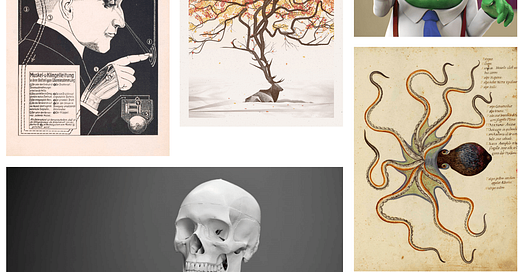The Book of Minds 6: The Species Matrix
In yesterday’s essay, I mentioned two ways of exploring the space of all possible minds. The functional approach enumerates the problems a mind needs to solve - 3D vision, navigation, grasping etc and it doesn’t matter whether the system doing the solving is human, animal or machine.
The other approach enumerates possible experiences, and here the nature of the experiences is at the core of the approach: what it feels like to the bat when it flits about a cave could be quite different from what it feels like to an eagle diving for a hunt. In a now famous paper, Thomas Nagel pointed out that while we can study the neurophysiology of bats without any problems, we don’t know how to even start studying bat experiences.
As finite beings, we are limited in every physical dimension: how fast we can run, our inability to fly and so on. Why would our mental dimensions be any different: if, so there are constraints on the thoughts we can think and the colors we can see. The successes of the physical sciences have revealed the cosmos from its very beginning, but subjectivity might be an entirely different kind of entity, one that cannot be understood using the objective methods of the physical sciences.
Are the minds of other creatures opaque to us by the very nature of their minds and ours?
Here’s an interesting possibility: that it may be possible to know another mind from our perspective which is not the same as knowing the same mind from the inside. We are all familiar with this seeming paradox: let’s say you’re talking to a friend who appears angry or disturbed to you but they insist that they’re feeling calm and collected from the inside. Who is right? Chances are, both of you are grasping a partial truth.
Your assessment might have more predictive value than the angry friend’s self-assessment: for example, you would predict that they will snap at an acquaintance (the cause of the irritation) while the friend would predict otherwise.
What it feels like for me to be a bat may or may not be the same as what it feels like for the bat to be a bat, but both are legitimate instances of what it feels like to be a bat.
Going back to yesterday’s division between the actual, the virtual and the possible, some minds are actual for us: our own being the most important. The minds of other humans are virtual (like how the house next door is virtual) while the specific contents of their minds are (mostly) possibles; I don’t know for sure what they’re thinking, but I can guess. How I appear to the person sitting across the table is virtual to me while actual to the other person. With the careful use of technology, we can get to the minds of other creatures that way: virtual access to their minds in general, and possible access to the specific contents of their minds. Or so I think.





